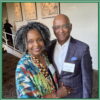By Gabriel Donahue, editor-in-chief
The second Black Mental Health Week ended Thursday after a week of programming to promote wellness for students of color led by the Towson University Healthy and Diverse Minds Peer Education Program.
Senior Kiera Robinson created Black Mental Health Week last spring. She is a Healthy and Diverse Minds team lead and has been a part of the group since her sophomore year.
“As a psychology major, I’m very involved in mental health, and as a Black woman, I’m very involved in Black mental health and just minority mental health in general,” Robinson said. “So I wanted to see how I would be able to implement this within my club.”
This year, programming increased from three to five events, she said. These included a dance class, movie night, and a lecture-style program about racism.
Last year saw a myth-busting tabling event, yoga and panel, according to Robinson.
First time Coordinator for Healthy and Diverse Minds Amber Walser oversaw the production of this year’s programs to ensure they aligned with the Counseling Center’s values. Healthy and Diverse Minds is one of three peer education programs housed by the Counseling Center.
“I was just really impressed with the creativity and the way that students responded to some of the things that we did, which will make it easier next time for us to schedule and organize these again,” Walser said.
Additionally, five barbers gave students free haircuts at a “Cut and Connect” event aimed at men of color. Roughly 30 students attended, Walser said.
Robinson estimated most of the events had about 25 students in attendance.
“I’m glad I was able to engage with many different students throughout the week,” she said. “And [being] able to see the positive reactions I had from students throughout the week was really great.”
To close out the week, Robinson led a Black mental health panel featuring student organization leaders, faculty and staff, including Senior Vice President for Student Affairs Vernon Hurte.
Robinson presented information on mental health stigma in the Black and Black LGBTQ+ communities before moderating the panelists’ discussion on their experiences.
The panel was the only Black Mental Health Week event senior James Wilson attended, but he called it “really great,” and said the topics resonated with him.
Rob Uma, a senior, attended the panel after going to “Cut and Connect” earlier in the week.
“Everybody gave people time to say what they wanted to say,” Uma said. “It really made it personal.”
Robinson is graduating after this semester, so she won’t be the one to organize Black Mental Health Week 2025. However, Walser said she foresees the program will remain a staple for Healthy and Diverse Minds.
“There seems to be momentum, so I do think we anticipate doing this again,” she said. “We really enjoyed it and saw that people benefited from it.”
Healthy and Diverse Minds has been on campus in some capacity for at least 18 years and is funded by a state grant, according to Emily Wiegand, assistant director of the Counseling Center.
The group focuses on promoting mental wellness and reducing stigma through outreach events and programming, Walser said. Most of the six peer educators are women of color.
“Healthy minds” and “diverse minds” were previously separate groups before merging in recent years, according to Walser.


